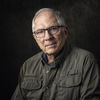DOFMaster question regarding FX lens on DX camera
Dec 23, 2011 10:17:10 #
How do I use the DOFMaster depth of field calculator for a DX camera (Nikon D7000) with a FX lens (e.g., Nikon 70-300mm f/4.5 - 5.6G ED-IF AF-S VR)?
In particular, I'm wondering how to enter the focal length. For example, if I have the FX lens set at 300mm, do I enter 300mm in DOFMaster or 300 x 1.5 = 450mm? My guess would be the latter, but I'm not sure.
In particular, I'm wondering how to enter the focal length. For example, if I have the FX lens set at 300mm, do I enter 300mm in DOFMaster or 300 x 1.5 = 450mm? My guess would be the latter, but I'm not sure.
Dec 23, 2011 10:25:21 #
Dec 23, 2011 11:23:35 #
The focal length doesn't change just because you put it on another camera - it's a property of the lens, not the sensor/film size.
http://www.dofmaster.com/faq.html
The first field you enter into the (online) calculator is the camera you are using. That is what takes the sensor/film size into account.
http://www.dofmaster.com/faq.html
The first field you enter into the (online) calculator is the camera you are using. That is what takes the sensor/film size into account.
Dec 23, 2011 11:43:48 #
snowbear wrote:
The focal length doesn't change just because you put it on another camera - it's a property of the lens, not the sensor/film size.
http://www.dofmaster.com/faq.html
The first field you enter into the (online) calculator is the camera you are using. That is what takes the sensor/film size into account.
http://www.dofmaster.com/faq.html
The first field you enter into the (online) calculator is the camera you are using. That is what takes the sensor/film size into account.
That's where I'm having trouble understanding this. On a DX camera, a 300mm FX lens actually has a focal length of 450mm; while of course a 300mm DX lens remains 300mm. Since we're not telling DOFMaster whether the lens is DX or FX, are you saying that the DOF is the same for these 2 scenarios? How about the hyperfocal distance? It just seems like they've *got* to be different.
Dec 23, 2011 12:13:53 #
It's a confusing subject.
The focal point is somewhere inside the lens, not on the sensor. There are elements in the lens, behind this point that get the image onto the sensor. I've heard of the last part referred to as "back focal length." This is what is different between the FX and DX lenses. The "forward focal length" is what is inscribed on the lens body (50mm, 90mm, 300mm, etc.)
To get a better idea, look at the camera/lens "cut=away" images here:
http://www.nikonusa.com/Learn-And-Explore/Nikon-Camera-Technology/g588ouey/1/The-DX-and-FX-Formats.html
The focal point is somewhere inside the lens, not on the sensor. There are elements in the lens, behind this point that get the image onto the sensor. I've heard of the last part referred to as "back focal length." This is what is different between the FX and DX lenses. The "forward focal length" is what is inscribed on the lens body (50mm, 90mm, 300mm, etc.)
To get a better idea, look at the camera/lens "cut=away" images here:
http://www.nikonusa.com/Learn-And-Explore/Nikon-Camera-Technology/g588ouey/1/The-DX-and-FX-Formats.html
Dec 23, 2011 12:17:15 #
DOF master asks you what camera you are using, so it is accounting for the sensor size. Just put in the REAL lens length.
Here is what is says on the site:
'Use the actual focal length of the lens for depth of field calculations. The calculator will automatically adjust for any "focal length multiplier" or "field of view crop" for the selected camera.'
For a given SUBJECT size and identical focal length, the FX camera will have a shorter DOF than a DX camera. This is because to make the subject size the same, the FX camera has to be closer to the subject.
Here is what is says on the site:
'Use the actual focal length of the lens for depth of field calculations. The calculator will automatically adjust for any "focal length multiplier" or "field of view crop" for the selected camera.'
For a given SUBJECT size and identical focal length, the FX camera will have a shorter DOF than a DX camera. This is because to make the subject size the same, the FX camera has to be closer to the subject.
Dec 23, 2011 12:23:35 #
Ljensen wrote:
No it doesn't, The 'crop sensor magnification' thing is a concept that is completely backwards in most people's minds, and it's not really your fault, unless you keep on propagating the wrong thinking.That's where I'm having trouble understanding this. On a DX camera, a 300mm FX lens actually has a focal length of 450mm
One more time...
Your 300mm lens on a crop-sensor body is still a 300mm focal length. The lens does NOT get longer when you put it on a crop camera. What it gives you is the FIELD OF VIEW that a 450mm lens would give you on a FULL FRAME body.
And, as others have noted, when you enter the camera body in to DOFMaster, it allows for 'crop sensor' bodies in it's internal programming.
Dec 23, 2011 12:39:29 #
snowbear wrote:
It's a confusing subject. br br The focal point i... (show quote)
Ok, I begin to see. That makes sense.
Dec 23, 2011 12:41:56 #
CaptainC wrote:
DOF master asks you what camera you are using, so ... (show quote)
Ok, that's helpful. I'm beginning to understand now.
Dec 23, 2011 12:44:53 #
Thanks everyone for your replies. It really makes sense now. The thing that really started to clear things up was the mention of concepts such as 'back focal length', 'forward focal length', and 'subject size'. Again, thanks to all for your help.
Dec 24, 2011 17:49:11 #
The focal length is still 300mm. However, the difference is in the size of the sensor, 23mm vs 35mm. The image must be magnified 1.5x in a 23mm sensor to equal the size of the image of a 35mm sensor.
Dec 24, 2011 18:13:40 #
FX on a DX has a multiplication factor of 1.6. A 200mm FX lens is 320mm on DX. It has to do with the image circle each lens format creates. FX is larger than DX.
Basically, that is the size ratio of the DX sensor to the full frame FX film/sensor camera.
Using 1.5X will give inaccurate results.
As a side note, using FX lenses on DX will be sharper for the DX camera, as you are using only the center portion of the image circle, which, in 99+% of all lens designs, is the sharpest portion of lens performance.
Basically, that is the size ratio of the DX sensor to the full frame FX film/sensor camera.
Using 1.5X will give inaccurate results.
As a side note, using FX lenses on DX will be sharper for the DX camera, as you are using only the center portion of the image circle, which, in 99+% of all lens designs, is the sharpest portion of lens performance.
Dec 24, 2011 18:37:53 #
PhotoArtsLA wrote:
FX on a DX has a multiplication factor of 1.6. A 2... (show quote)
On Nikon, the crop factor is 1.5. On some Canon cameras it is 1.6. But since we are using terms like FX and DX, I assume we are discussing Nikon cameras.
Dec 24, 2011 21:08:51 #
Just a question...I thought a Nikon lens was a Nikon lens. What's the deal about FX lenses and DX lenses? splain it to me!!
Dec 24, 2011 21:21:45 #
A DX lens is designed for use on a DX (cropped) sensor camera, it will yield ratings as displayed on the lens barrel. ie, an 18-105mm lens will yield the equivalent zoom as an 18mm to 105mm standard lens will yield on an FX (Full Frame) body. A standard lens (non DX) when used on a DX body will yield a magnification that is 1.5 times (NOT 1.6 times) the rating as displayed on the barrel. ie, a 28-300mm Nikkor zoom will produce the same results as a 42mm lens on the short end, and a 450mm lens on the long end.
This link may help to:
http://www.differencebetween.net/technology/difference-between-dx-and-fx-lens/
This link may help to:
http://www.differencebetween.net/technology/difference-between-dx-and-fx-lens/
If you want to reply, then register here. Registration is free and your account is created instantly, so you can post right away.






